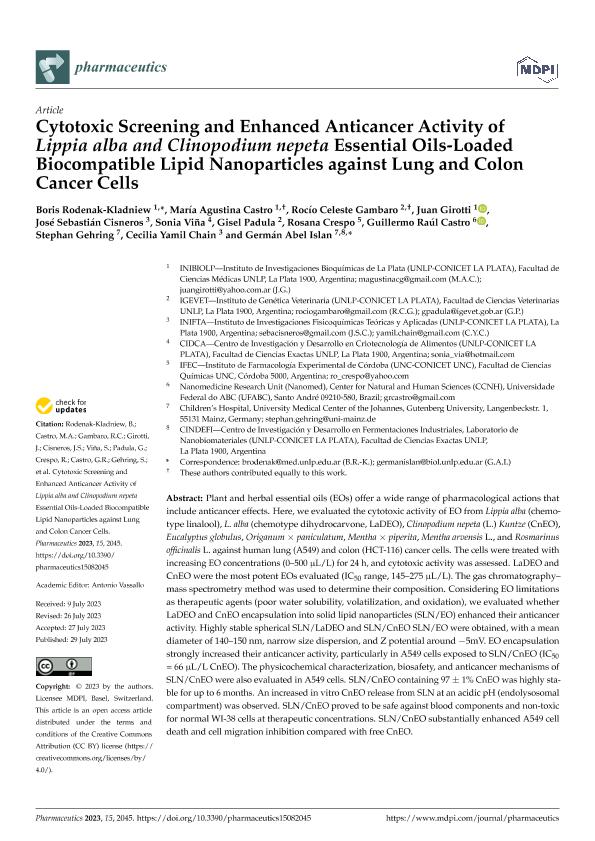Artículo
Cytotoxic Screening and Enhanced Anticancer Activity of Lippia alba and Clinopodium nepeta Essential Oils-Loaded Biocompatible Lipid Nanoparticles against Lung and Colon Cancer Cells
Rodenak Kladniew, Boris Emilio ; Castro, Maria Agustina
; Castro, Maria Agustina ; Gambaro, Rocío Celeste; Girotti, Juan Roberto
; Gambaro, Rocío Celeste; Girotti, Juan Roberto ; Cisneros, José Sebastián
; Cisneros, José Sebastián ; Viña, Sonia Zulma
; Viña, Sonia Zulma ; Padula, Gisel
; Padula, Gisel ; Crespo, Rosana
; Crespo, Rosana ; Castro, Guillermo Raúl; Gehring, Stephan; Chain, Cecilia Yamil
; Castro, Guillermo Raúl; Gehring, Stephan; Chain, Cecilia Yamil ; Islan, German Abel
; Islan, German Abel
 ; Castro, Maria Agustina
; Castro, Maria Agustina ; Gambaro, Rocío Celeste; Girotti, Juan Roberto
; Gambaro, Rocío Celeste; Girotti, Juan Roberto ; Cisneros, José Sebastián
; Cisneros, José Sebastián ; Viña, Sonia Zulma
; Viña, Sonia Zulma ; Padula, Gisel
; Padula, Gisel ; Crespo, Rosana
; Crespo, Rosana ; Castro, Guillermo Raúl; Gehring, Stephan; Chain, Cecilia Yamil
; Castro, Guillermo Raúl; Gehring, Stephan; Chain, Cecilia Yamil ; Islan, German Abel
; Islan, German Abel
Fecha de publicación:
07/2023
Editorial:
MDPI
Revista:
Pharmaceutics
ISSN:
1999-4923
Idioma:
Inglés
Tipo de recurso:
Artículo publicado
Clasificación temática:
Resumen
Plant and herbal essential oils (EOs) offer a wide range of pharmacological actions that include anticancer effects. Here, we evaluated the cytotoxic activity of EO from Lippia alba (chemotype linalool), L. alba (chemotype dihydrocarvone, LaDEO), Clinopodium nepeta (L.) Kuntze (CnEO), Eucalyptus globulus, Origanum × paniculatum, Mentha × piperita, Mentha arvensis L., and Rosmarinus officinalis L. against human lung (A549) and colon (HCT-116) cancer cells. The cells were treated with increasing EO concentrations (0–500 µL/L) for 24 h, and cytotoxic activity was assessed. LaDEO and CnEO were the most potent EOs evaluated (IC50 range, 145–275 µL/L). The gas chromatography–mass spectrometry method was used to determine their composition. Considering EO limitations as therapeutic agents (poor water solubility, volatilization, and oxidation), we evaluated whether LaDEO and CnEO encapsulation into solid lipid nanoparticles (SLN/EO) enhanced their anticancer activity. Highly stable spherical SLN/LaDEO and SLN/CnEO SLN/EO were obtained, with a mean diameter of 140–150 nm, narrow size dispersion, and Z potential around −5mV. EO encapsulation strongly increased their anticancer activity, particularly in A549 cells exposed to SLN/CnEO (IC50 = 66 µL/L CnEO). The physicochemical characterization, biosafety, and anticancer mechanisms of SLN/CnEO were also evaluated in A549 cells. SLN/CnEO containing 97 ± 1% CnEO was highly stable for up to 6 months. An increased in vitro CnEO release from SLN at an acidic pH (endolysosomal compartment) was observed. SLN/CnEO proved to be safe against blood components and non-toxic for normal WI-38 cells at therapeutic concentrations. SLN/CnEO substantially enhanced A549 cell death and cell migration inhibition compared with free CnEO.
Archivos asociados
Licencia
Identificadores
Colecciones
Articulos(CIDCA)
Articulos de CENTRO DE INV EN CRIOTECNOLOGIA DE ALIMENTOS (I)
Articulos de CENTRO DE INV EN CRIOTECNOLOGIA DE ALIMENTOS (I)
Articulos(CINDEFI)
Articulos de CENT.DE INV EN FERMENTACIONES INDUSTRIALES (I)
Articulos de CENT.DE INV EN FERMENTACIONES INDUSTRIALES (I)
Articulos(IFEC)
Articulos de INST. DE FARMACOLOGIA EXPERIMENTAL DE CORDOBA
Articulos de INST. DE FARMACOLOGIA EXPERIMENTAL DE CORDOBA
Articulos(IGEVET)
Articulos de INST.DE GENETICA VET ING FERNANDO NOEL DULOUT
Articulos de INST.DE GENETICA VET ING FERNANDO NOEL DULOUT
Articulos(INIBIOLP)
Articulos de INST.DE INVEST.BIOQUIMICAS DE LA PLATA
Articulos de INST.DE INVEST.BIOQUIMICAS DE LA PLATA
Articulos(INIFTA)
Articulos de INST.DE INV.FISICOQUIMICAS TEORICAS Y APLIC.
Articulos de INST.DE INV.FISICOQUIMICAS TEORICAS Y APLIC.
Citación
Rodenak Kladniew, Boris Emilio; Castro, Maria Agustina; Gambaro, Rocío Celeste; Girotti, Juan Roberto; Cisneros, José Sebastián; et al.; Cytotoxic Screening and Enhanced Anticancer Activity of Lippia alba and Clinopodium nepeta Essential Oils-Loaded Biocompatible Lipid Nanoparticles against Lung and Colon Cancer Cells; MDPI; Pharmaceutics; 15; 8; 7-2023; 1-17
Compartir
Altmétricas



